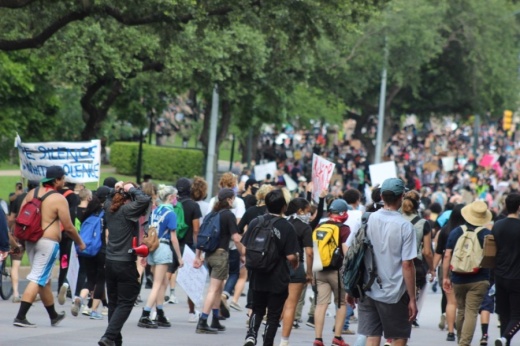The protests, sparked by the May 25 death of Floyd, an unarmed black man who was killed by Minneapolis police, and fanned locally by the killing of Austin resident Michael Ramos, another unarmed black man who was shot three times and killed by an Austin police officer April 24, have continued since May 29.
For a moment over the weekend, concerns over the coronavirus pandemic took the passenger seat as demonstrations in the name of Floyd and substantial police reform took place across the country. However, health officials emphasized the coronavirus and the significant health concerns have not subsided. On June 1, Austin posted its highest seven-day case increase—425—and highest daily case increase—88—since the pandemic began.
Stephanie Hayden, the director of the Austin Public Health Department, said anyone who has participated in the demonstrations should sign up for a free coronavirus test through the city’s public enrollment forum.
Dr. Mark Escott, Austin-Travis County’s interim health authority, said he was happy to see people wearing face coverings, but the lack of social distancing at the protests was a concern.
“We’re expecting an increase in cases,” Escott said. “When it comes down to it, this is a disease transmitted through person-to-person interactions.”
The Austin Justice Coalition had planned a large demonstration in front of the Texas Capitol for May 31 but canceled at the last minute due to concerns over increasing violence seen at protests over the weekend. Executive Director Chas Moore said the coronavirus was considered while organizing the event, and groups had donated face coverings.
“Coronavirus didn’t just disappear because racism is so prevalent again; it was absolutely always in the back of our minds,” Moore told Community Impact Newspaper.
However, he said the issues of racism and reforming police culture were far too important, and the virus was not going to hold protesters back from calling for change in the streets.
Although Moore’s group canceled its May 31 event, he said the coalition is actively planning something for the near future.
Following the weekend’s events, Austin Mayor Steve Adler said he was gravely concerned about the demonstrations’ impact on the community’s battle against the coronavirus.
“It’s a significant fear,” Adler said. “These kinds of big events are super spreader events. If there are a few people who are infected, they could end up infecting a lot of other people. These events are extremely difficult, if not impossible, to contact trace. That’s a very real fear.”
Adler said he had to make the “very hard choice” to not be out with protesters May 31 because he has been the “biggest cheerleader” in the city for people to not gather in large groups. He said conversations over systemic inequities, racism and police culture need to be front and center in the community; however, Adler said avoiding large groups remains the recommendation.
Although the area has seen a recent uptick in cases, health officials have switched the virus impact's key indicator from new cases to new hospitalizations. Escott said they are closely watching the seven-day rolling average of daily, virus-related hospital admissions. If that number eclipses 20, Escott and Adler said they would consider new lockdown measures. However, Escott said June 3 that the area's hospital capacity is "in good shape" and is prepared to handle a spike in cases.
Medical experts have said it takes anywhere from one to 14 days between the moment someone is exposed to the coronavirus and the time symptoms begin. As well as signing up for a test, The city health department has recommended that anyone who attended demonstrations over the weekend continue to monitor symptoms and “use caution” when around those over 65 years old or with underlying health conditions.
“We will still need the people who are demonstrating on this issue in a month or two,” Adler said. “We can’t afford to lose people, or their parents, or their grandparents while we do this. If people gather outside, I wish they would stay at a greater distance. I am very concerned about the COVID-19 impact of this past weekend.”





